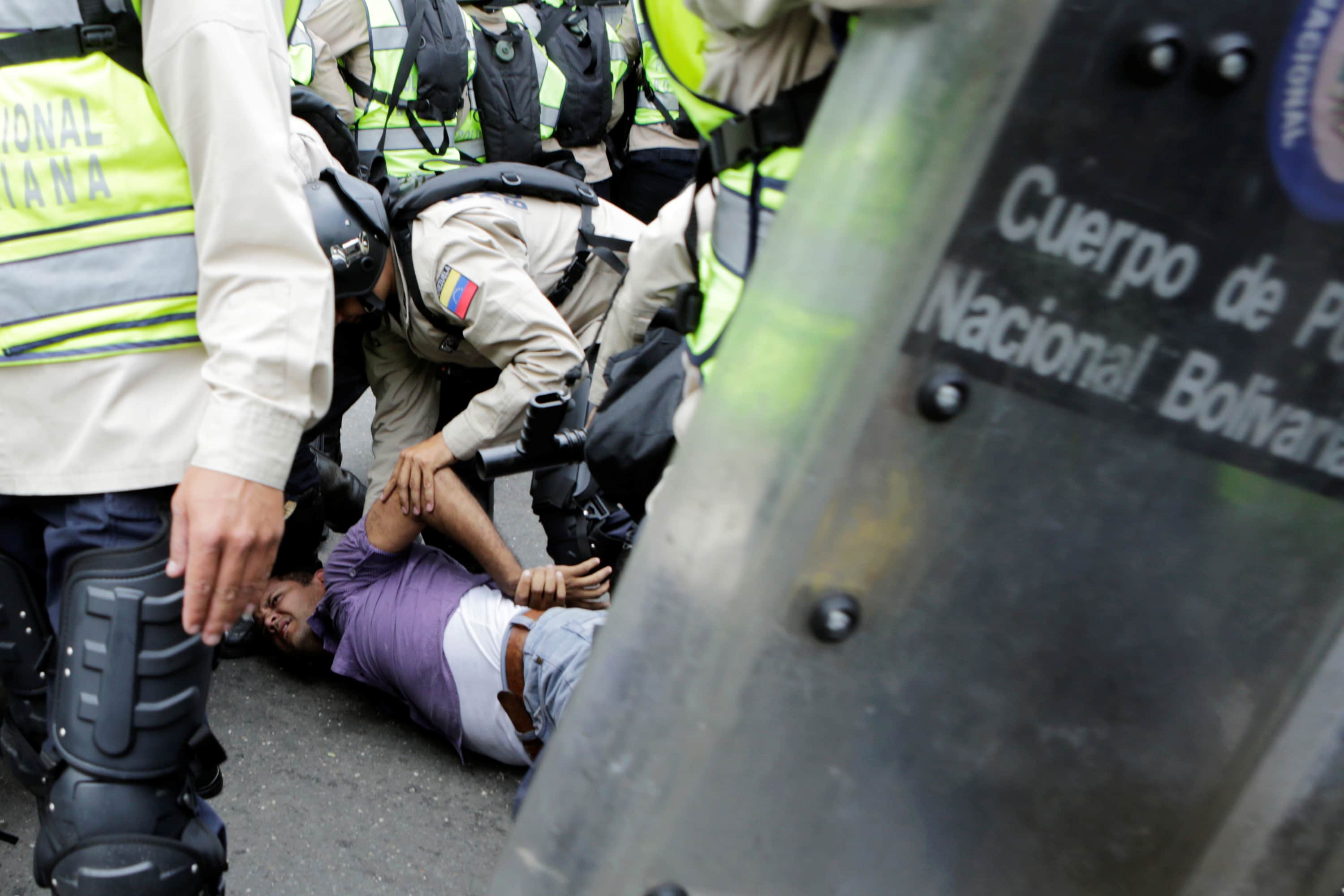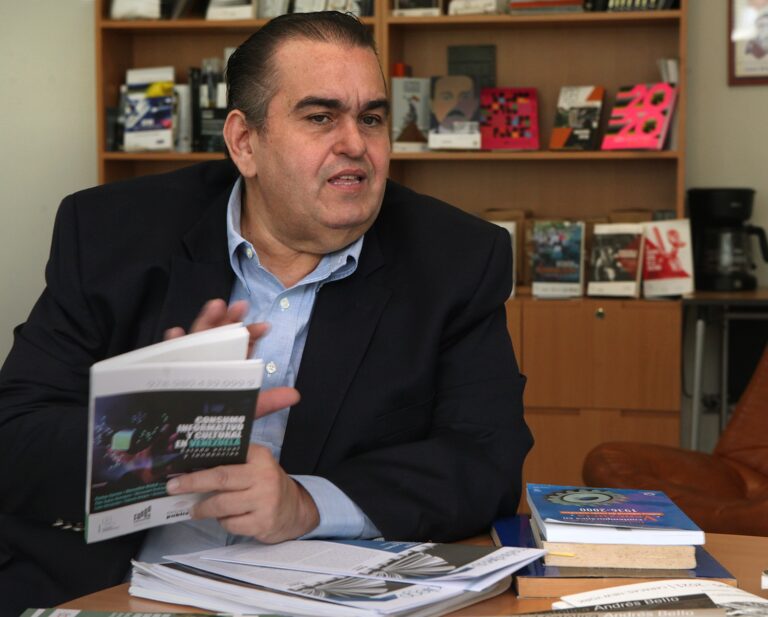Since May 2016, the Bolivarian National Intelligence Service (Servicio Bolivariano de Inteligencia Nacional, SEBIN) and National Guard have detained 21 people on allegations that they were planning, fomenting, or had participated in violent anti-government actions.
This statement was originally published on hrw.org on 27 July 2016.
The Organization of American States (OAS) should press authorities from Venezuela’s Maduro administration to release and drop criminal charges against anyone who has been arbitrarily detained and charged, Human Rights Watch said today. The OAS should also press Venezuela so its authorities investigate allegations that several detainees have been beaten and tortured in custody, and make the results of the investigations public.
Since May 2016, the Bolivarian National Intelligence Service (Servicio Bolivariano de Inteligencia Nacional, SEBIN) and National Guard have detained 21 people on allegations that they were planning, fomenting, or had participated in violent anti-government actions. Most allege they have been tortured or otherwise abused in custody. In several cases, prosecutors failed to present any credible evidence linking the accused to crimes, but courts charged them anyway. In some cases, the evidence included mere possession of political materials, including pamphlets calling for the release of political prisoners.
“The Maduro administration speaks about dialogue abroad, while cracking down on political dissent at home,” said José Miguel Vivanco, Americas director at Human Rights Watch. “Without strong regional pressure, the Venezuelan government may well believe that it can get away with brutal and authoritarian punishment for dissent.”
All but two of the 21 people detained have been charged with criminal offenses, and nine remain in detention.
In several cases, detainees testified in court that they had suffered physical abuse that could amount to torture, including brutal beatings, electric shocks, and threats of rape or murder. The patterns of maltreatment they describe are consistent with cases Human Rights Watch has documented during the past two years in Venezuela. Some detainees said that they were tortured to coerce them into confessing to crimes, and that SEBIN agents taped their coerced confessions.
Human Rights Watch conducted in-country research in June 2016, and interviewed family members and lawyers as well as one of the people detained, and reviewed key documents in judicial files in several cases, including police records and the direct testimony of 11 detainees, as well as statements by government officials. The 21 cases were from Caracas and Bolivar, Cojedes, and Zulia states.
Most detainees were political activists who said that they were merely involved in political protest and advocacy, such as calling for the release of political prisoners or supporting the recall referendum against President Nicolás Maduro. The government linked 10 to an anti-government demonstration in which unidentified people had attacked police officers. Prosecutors asserted that most were caught participating in or preparing to commit acts of violence but did not provide credible evidence to support such assertions. Some testified that they had not participated in the demonstration at all.
Police reports, prosecutors, and judges cited lawful political publications as evidence to charge the detainees, according to judicial files and statements by government officials or supporters. The publications included flyers requesting the release of the opposition leader Leopoldo López, and paperwork to promote a recall referendum. Evidence cited against some included a backpack with the logo of the opposition party Justice First (Primero Justicia). One was charged on the strength of information provided by an anonymous “patriotic informant,” even though the prosecutor said in court that charges would be inappropriate in that case.
Government officials and pro-government politicians routinely announced the charges against many of these detainees before the court had actually made them public, Human Rights Watch said.
None of the 19 detainees who ultimately appeared in court were able to contact a lawyer until minutes before appearing before a judge, which in most cases was after the 48-hour Venezuelan legal limit, detainees’ families and lawyers said. Two detainees were released without charge and never brought before a judge. One of them testified before a prosecutor that he was held incommunicado for five days at SEBIN offices in Caracas, badly abused, and then freed. The other testified in a written petition filed with a prosecutor that he was released after being forced to sign a blank piece of paper at a SEBIN office in Zulia state.
Ten were detained after an anti-government demonstration in Caracas on May 18. Interior and Justice Minister Gustavo González López appeared on TV after that demonstration to say that the government had identified a group of people responsible for “destabilizing” actions and violence against security forces.
One, José Gregorio Hernández Carrasco, a 20-year old student who participated in the May 18 demonstration, was detained two days later at his work, he said. He was beaten and tortured and finally agreed to sign a confession because his abusers threatened to rape him. The torture included applying electric shocks, covering his head with a plastic bag to choke him, and placing a stick on his rectum and threatening to rape him. Hernández Carrasco remains in detention and subject to criminal prosecution, despite the fact that the Attorney General’s Office failed to present any credible evidence against him.
Venezuelan authorities have, since February 2014, arbitrarily arrested, prosecuted, and convicted several leading opposition politicians, as well as lesser known activists. López and others arbitrarily detained during the 2014 anti-government protests remain in detention or subject to prosecution. Since June 2016, the government has also allegedly fired dozens of workers of the customs and tax office nationwide in apparent retaliation for supporting efforts to secure a recall referendum for President Maduro. Hundreds of other referendum supporters have reportedly been fired in similar circumstances by other government agencies.
The lack of judicial independence in Venezuela has enabled such arbitrary prosecutions and dismissals, Human Rights Watch said. One of the key principles enshrined in the Inter-American Democratic Charter, which was adopted fifteen years ago by the OAS, is “the separation of powers and independence of the branches of government.” Governments have an obligation to promote and defend that principle, the Charter asserts.
OAS Secretary General Luis Almagro presented a comprehensive report on May 30, invoking the application of the charter to Venezuela. The report describes in great detail the human rights and humanitarian crisis that the country is facing.
The OAS Permanent Council met on June 23, to evaluate Almagro’s report. Despite Venezuela’s contention that a debate on the report violated its sovereignty, a majority of member countries voted to move forward and evaluate Venezuela’s compliance with the charter.
The Venezuelan Foreign Affairs Ministry has said the government supports “dialogue and peace diplomacy,” but Maduro has said that dialogue with the Venezuelan opposition must be “without conditions.” The opposition has said that, as part of any dialogue, the government must release political prisoners and agree to carry out the recall referendum vote on Maduro’s presidency in 2016.
“If Maduro wants to suspend the ongoing Democratic Charter’s process, he will have to show concrete results and demonstrate that his government is ending abusive practices,” Vivanco said. “As part of any meaningful dialogue, OAS member states should press Venezuela to stop jailing its critics and end its crackdown on dissent.”



